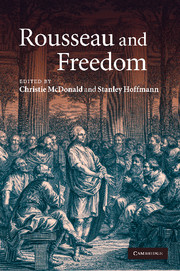Book contents
- Frontmatter
- Contents
- List of illustrations
- Notes on contributors
- Acknowledgments
- List of abbreviations
- Introduction
- PART I
- PART II
- 7 The Social Contract, or the mirage of the general will
- 8 “Par le bon usage de ma liberté”: freedom and Rousseau's reconstituted Christianity
- 9 The constraints of liberty at the scene of instruction
- 10 “Toutes mes idées sont en images”: Rousseau and the yoke of necessity
- 11 Rousseau's ruins
- 12 Can woman be free?
- 13 The subject and its body: love of oneself and freedom in the thought of Rousseau
- PART III
- Bibliography
- Index
7 - The Social Contract, or the mirage of the general will
Published online by Cambridge University Press: 05 May 2010
- Frontmatter
- Contents
- List of illustrations
- Notes on contributors
- Acknowledgments
- List of abbreviations
- Introduction
- PART I
- PART II
- 7 The Social Contract, or the mirage of the general will
- 8 “Par le bon usage de ma liberté”: freedom and Rousseau's reconstituted Christianity
- 9 The constraints of liberty at the scene of instruction
- 10 “Toutes mes idées sont en images”: Rousseau and the yoke of necessity
- 11 Rousseau's ruins
- 12 Can woman be free?
- 13 The subject and its body: love of oneself and freedom in the thought of Rousseau
- PART III
- Bibliography
- Index
Summary
The last word will never be written about the political thought of Jean-Jacques Rousseau.
Jean-Jacques ChevallierOne would hesitate to add to the enormous literature already written about Rousseau's Social Contract, if one didn't have the feeling that there is always something left to say. Many of those who have tried to offer a faithful interpretation of the main themes of Rousseau's treatise have lost sight of what might be ambiguous or dangerous about them, and have too often presented them as the solid elements of a perfectly coherent construction. On the other hand, most of those who have criticized Rousseau's thought and found germs of tyranny in his pages, of absolutism in the regimes that were inspired by them, have forgotten the work's premises and the author's intentions: that Rousseau was trying to define a social order founded on man's freedom, the primordial imperative that Rousseau spent his life celebrating. Between these two extremes, there is still room for interpretation, synthesis, and analysis of the main themes of the Social Contract, so as to take into account both the intentions and the results, ideals and reality.
The theme of the general will is at the very heart of the Social Contract. The doubts that it has generated, the prestige that it has enjoyed, have given it the status of a myth. But there are two kinds of myths.
- Type
- Chapter
- Information
- Rousseau and Freedom , pp. 113 - 141Publisher: Cambridge University PressPrint publication year: 2010
- 2
- Cited by



